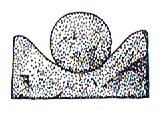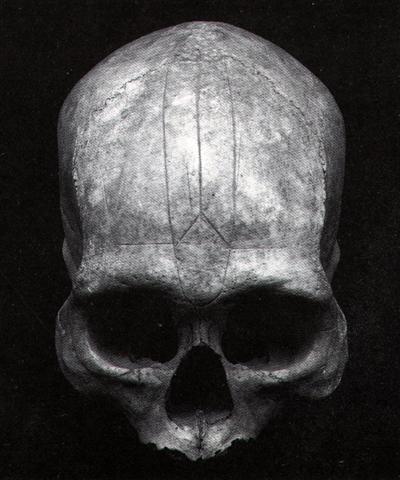Before reading by way of the alphabet there was
counting by using numbers. And before reading and counting there were
pictures and perceiving.
|
Alphabet |
Reading |
Û
INSIGHT |
|
Numbers |
Counting |
|
Pictures |
Perceiving |
Insight (meaning) was also communicated through language,
and its words (names) were submitted to pressure from the
survival of the fittest. Ursa was a female bear and a male
bear was ursus - it had been found necessary to distinguish between the sexes.
Major
was great and minor was little, also size was fundamental.
When in Manuscript E it was stated that Hotu
(as in the name for the night of the full moon) arrived in
Tagaroa Uri 15, it was a date chosen in order to illuminate what his
arrival meant for the inhabitants on Easter Island. The night of
the Full Moon was in the center of the month, between the waxing
and waning faces, and in its 'nakshatra' position was the New
Moon.
... When the new moon
appeared women assembled and bewailed those who had died since
the last one, uttering the following lament: 'Alas! O moon! Thou
has returned to life, but our departed beloved ones have not.
Thou has bathed in the waiora a Tane, and had thy life
renewed, but there is no fount to restore life to our departed
ones. Alas ...
| Aue
Ah, alas. Aueue,
oh. P Pau., Ta.: aue, alas. Mgv.: aue,
auhe, alas. Mq.: aue, oh, alas; auhe,
a sigh. Exclamation in general representing the most
primordial type of speech, it seems that this may be
reduced to recognizable elements. The e is
throughout these languages a vocative or hailing sign,
commonly postpositive in relation to the person hailed.
In the examination of au we have shown that the
primal first person singular designation is u.
With the comparatively scanty material afforded by this
vocabulary we may not attempt ot define the use of a
but we have no hesitation in noting that proof based on
wider studies will show it to have, inter alia, a
characteristic function as a word-maker. In a very high
degree, then, a-u-e is represented by a common
English interjection 'oh my!' in which oh = a, my
= u, and e = !. Churchill.
What is this
cry which our primitive islanders share with the
animals? Look at its elements, all full-throated. First
we have a, the sound of mouth open, fauces open,
lungs full of air. As air expires the sound recedes in
the mouth towards the palate and we find the u.
Last comes the conscious finish of the utterance, the
muscles begin to retract, the sound-making point is
forced forward and the sound is e. If the man had
but a few more cubic centimeters of lung capacity he
could attain cow volumne for his cry, or interjection,
since it amounts to the same thing. Churchill 2.
|
| Au
Au 1. Me, I. Personal pronoun used
in conjunction with verbs; when on its own, the form
used is koau. 2. Smoke; au kiokio, thick,
pungent smoke (of a fire). 3. Current; he-haro te
vaka i te au , the boat is towed off course in the
current. 4. Dew. 5. bile, gall. 6. Au moa,
chicken's gall; greenish colour (like that of gall). 7.
Au ra'e, the people first served in a feast where
food or gifts are distributed. 8. Au hopu bonito
fish. Vanaga.
A'u 1. Birthing pains;
matu'a a'u, biological mother (not adoptive);
vi'e hakaa'u, midwife. 2. Vessel, cup (Tahitian
word). Vanaga.
1. I (vau). P Mgv., Mq., Ta.:
au, I. Ta.: vau, id. In its simplest
Polynesian form this pronoun is compound, u being
the element in which inheres the ego sense. We note here
the occurrence of forms in which au is modified.
The Maori has ahau, a composite of a and
hau. The vau type is found in Rapanui,
Paumotu and Tahiti, ovau in Tahiti and Paumotu,
kovau in Rapanui, wau in Hawaii,
owau in Hawaii, awau in the South Island
Maori, avou in Aniwa. 2. The gall. P Mgv.: au,
hau, eahu, gall. Mq., Ta.: au, id.
The aspirated Mangarevan eahu may preserve a
Proto-Samoan original, for we find ahu in Tonga
and Niuē, two languages
generally retentive of an original aspiration which has
vanished from Samoan. 3. Vapor, smoke T. P Mgv.:
ahu, au,
cloud mist. Ta.: au,
smoke vapor. Of the Proto-Samoan stem asu
all the Tongafiti languages have lost the consonant,
except for its interesting preservation as an
alternative in Mangarevan, and all have lost the
distinctive smoke sense. The attribution of smoke as a
meaning in Rapanui
we owe to an authority of the second rank, but taken
with the form preservation in Mangarevan this sense
retention is probable, and taken in coagmentation they
bear upon the central theme of a Proto-Samoan migration
onward to Southeast Polynesia. Auahi
(au 3 -
ahi 1),
smoke; miro auahi,
steamboat. Mgv.: auahi,
smoke. Mq.: auahi,
smoke, vapor. Ta.: auahi,
fire. Churchill. |
| Hotu
Ta.: hotu, to produce fruit, Sa.:
fotu, id. Mgv.: akahotu, the September
season. Churchill.
H.: Hoku, Night of the full
moon. When this moon set before daylight it was called
Hoku Palemo, Hoku that slips away. When it set
after daylight it was called Hoku Ili, grounded
Hoku. Ka mahina o Hoku, the full moon of the
night Hoku. Cf. hōkū, star. Hō kū,
star. (PPN fetu'u). Wehewehe.
... When
this tremendous task had been accomplished Atea
took a third husband, Fa'a-hotu, Make Fruitful.
Then occurred a curious event. Whether Atea had
wearied of bringing forth
offspring we
are not told, but certain it is that Atea and her
husband Fa'a-hotu exchanged sexes. Then the
[male] eyes of Atea glanced down at those of his
wife Hotu and they begat Ru. It was this
Ru who explored the whole earth and divided it
into north, south, east, and west ... |
It implied nighttime was reborn with the
Moon at the horizon in the southwest, as if the Night had been magically
produced by separating a pair of hulls (like knees).

|
Po
1. Night; to get dark, to fall (of
night): he-po, it is getting dark. Formerly used,
with or without raá, in the meaning of a whole
day: po tahi, one day; katahi te kauatu marima
po, fifteen days; po tahi raá, first day of
the week; po rua raá, po toru raá, second, third
day, etc. 2. Alone or as po nui, used to express
the idea of good luck, happiness. He-avai-atu au
to'ou po, I wish you good luck (when taking leave of
someone). Very common was this parting formula: aná
po noho ki a koe! good luck to you! Po-á, morning;
i te po-á, in the morning; i te po-era-á,
very early in the morning. Po-ará, quickly,
rapidly, swiftly: he-iri po-ará, go up quick;
he-ta'o itau umu era po-ará, he cooked it quickly.
Po-e-mahina, formerly used of sleep-walkers (haha
a po). Vanaga.
1. Darkness, night, late; po haha,
dark night, gloom. P Tu. po-tagotago, darkness.
Mgv., Mq., Ta.: po, darkness, night. 2. Calendar
day; po e rua, Tuesday; po o te tagata,
life. P Pau., Mgv., Mq., Ta.: po, calendar day.
Churchill. |
Therefore the date
Tagaroa Uri 15 ought to have corresponded to the southern spring
equinox, in the middle (vaega) between the northern summer
and winter.
|
Vae
Va'e: Foot, leg; te va'e
mata'u, te va'e maúi, right foot, left foot.
Va'e ruga, va'e raro, quick and light, without
detour (lit.: foot up, foot down). Ka-oho koe ki
a nua era va'e ruga va'e raro, ina ekó hipa-hipa,
hurry straight to your mother, do not make any
detours. Va'e pau, misshapen foot, clubfoot.
Vae, to choose. Vaega, middle, centre;
i vaega o, in the middle of. Vanaga.
1. Foot, paw, leg, limb; vae no
roto, drawers; karikari vae, ankle. P
Pau.: vaevae, foot, leg. Mgv.: vaevae,
id. Mq.: vae, id. Ta.: vaevae, avae,
id. 2. Pupil. 3. To choose, elect, prefer, promote,
vote; vavae, to destine, to choose; vaea
(vae 2), pupil. Vaeahatu (vae 1
- ahatu): moe vaeahatu, to sleep
sprawling with legs extended. Vaega, center,
middle, within, half; o vaega, younger; ki
vaega, among, between, intermediate. P Pau.:
vaega, the middle. Mgv.: vaega, center,
middle. Mq.: vaena, vavena, vaveha,
id. Ta.: vaehaa, half. Vaehakaroa (vae
1 - roa): moe vaehakaroa, to sleep
with legs stretched out. Vaehau (vae 1
- hau 3), pantaloons, trousers.
Vaeherehere (vae 1 - here 1), to
attach by the paw. Vaerere (vae 1 -
rere 1), to run. Churchill.
Ta.: 1.
Timbers of a boat. Ha.: wae, knees,
side timbers of a boat. 2. To share out. Sa.: vae,
to divide, to share. Ma.: wawae, to divide.
Churchill. |
Wooden clappers were used in ancient China to make clear
for everyone that 'the hulls should be tightly lashed
together' in preparation for the new 'spring fire':
... In China, every
year about the beginning of April, certain officials called
Sz'hüen used of old to go about the country armed with
wooden clappers. Their business was to summon the people and
command them to put out every fire. This was the beginning of
the season called Han-shih-tsieh, or 'eating of cold
food'. For three days all household fires remained extinct as a
preparation for the solemn renewal of the fire, which took place
on the fifth or sixth day after the winter solstice [Sic!]. The
ceremony was performed with great pomp by the same officials who
procured the new fire from heaven by reflecting the sun's rays
either from a metal mirror or from a crystal on dry moss. Fire
thus obtained is called by the Chinese heavenly fire and its use
is enjoined in sacrifices: whereas fire elicited by the friction
of wood is termed by them earthly fire, and its use is
prescribed for cooking and other domestic purposes
...
Thus Easter Island was reborn in spring in a
fashion which resembled the
way in which Raven had created Haida Gwaii (and the mainland):
... The old man gave
the Raven two small sticks, like gambling sticks, one black, one
multicoloured. He gave him instructions to bite them apart in a
certain way and told him to spit the pieces at one another on
the surface of the sea. The Raven climbed back up the pole,
where he promptly did things backwards, just to see if something
interesting would occur, and the pieces bounced apart. It may
well be some bits were lost. But when he gathered what he could
and tried again - and this time followed the instructions he had
been given - the pieces stuck and rumpled and grew to become the
mainland and Haida Gwaii ...
But the powerful spring sun could not be allowed
to continue indefinitely.
... At mid-summer, at
the end of a half-year reign, Hercules is made drunk with mead
and led into the middle of a circle of twelve stones arranged
around an oak, in front of which stands an altar-stone; the oak
has been lopped until it is T-shaped. He is bound to it with
willow thongs in the 'five-fold bond' which joins wrists, neck,
and ankles together, beaten by his comrades
till
he faints, then flayed, blinded, castrated, impaled with a
mistletoe stake, and finally hacked into joints on the
altar-stone ...

... Skulls with
incised carvings, imbued with power by Makemake, were
placed in the fowl house to promote the egg-laying capacity of
the occupants ... The skulls of the chiefs are for the chicken,
so that thousands may be born' (te puoko ariki mo te moa, mo
topa o te piere) ... As long as the source of mana is kept
in the house, the hens are impregnated (he rei te moa i te
uha), they lay eggs (he ne'ine'i te uha i te mamari),
and the chicks are hatched (he topa te maanga)
...

|


